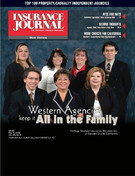RIMS Annual Meeting
The risk management community and some of the world’s largest insurance brokers sent mixed signals on the future of contingent commissions for insurance brokers and other potential areas of conflict of interest at this year’s Risk and Insurance Management Society annual conference.
RIMS President Ellen Vinck said that brokers should be paid by their clients only, and not by insurers. “The model should be that brokers are paid by one source and that is the client,” she said.
She also argued that the insurance industry should adopt an industry-wide ban on contingent fees or run the risk of government stepping in to do it for the industry.
“We agree that there is not one service model but that there should be one model for compensation,” Vinck told the RIMS gathering.
However, the organization stopped short of issuing a policy statement calling for an end to contingent commissions. The leaders said it was the responsibility of individual risk managers to convince their brokers to discontinue contingencies and disclose all income.
Challenges risk managers
“Each risk manager must define what he needs,” said Vinck. Vinck, who is vice president of risk management and safety for United States Marine Repair Inc., challenged her fellow risk managers and brokers to work together to build a new compensation model, arguing that RIMS can’t do it for them.
“Risk managers, don’t sit back. Don’t be quiet anymore,” Vinck said.
RIMS leaders said risk managers are to blame along with brokers and insurers for the current turmoil over compensation and disclosure because they have not asked brokers for an accounting of their services and compensation. “I think that’s a shame,” she said.
“For many years there has been aura of secrecy in regards to the practices if insurance brokers and insurance companies,” the RIMS leader said. “This secrecy continues to be the primary cause of the erosion of faith that risk managers have in their brokers.”
At the same forum, the chief executives of the two largest insurance brokers, Marsh and Aon, whose firms have both eliminated contingencies, disagreed over whether all brokers should follow their example and do away with contingencies throughout the industry. Some brokers continue to support contingent fees.
Michael Cherkasky, CEO and president of Marsh, said the marketplace “needs to say no” to contingent commissions because they are “inherently” a problem. While he agreed that the industry should adopt a unified position against contingencies, he said he did not favor regulation to achieve this.
“What does federal regulation ever do positively for any industry?” Cherkasky commented.
Can’t speak for others
Aon Corp. Executive Chairman Patrick Ryan disagreed that a unified position is needed. “I can’t speak for another broker. It’s up to them,” Ryan said.
All agreed, however, that however compensation is paid, it should be fully disclosed.
Ryan also shed some light on Aon’s decision to sell its wholesale brokerage unit, Swett & Crawford. “It’s worth more to an independent buyer than to us,” Ryan said, noting that in today’s environment, both inside Aon and outside brokers may be reluctant to use a wholesaler that is owned by a broker because of perceived conflicts.
He stressed that Aon will, however, remain in the reinsurance brokerage business.
Marsh’s Cherkasky, whose firm bought risk mitigation expert Kroll in May 2004, said certain conflicts are acceptable “but only if they further clients’ interest.” He cited the ability of Marsh to bundle certain insurance, claims and risk management services as an advantage for clients.
As with compensation, however, all relationships must be transparent, Cherkaksy added.
Plumeri seeks higher standard
In his remarks, keynote speaker Joseph Plumeri, CEO of Willis Group, also addressed the compensation subject, maintaining that “contingent commissions are inconsistent with client advocacy and unacceptable” for insurers to pay and agents and brokers to accept.
“We should abolish contingent commissions throughout the industry,” declared Plumeri, whose own firm has cut them out.
“It must be 100 percent clear who the broker is working for. That means a broker can only be paid by one party in any transaction,” the Willis leader continued. “It’s time we step up to a higher standard. Contingents should be abolished throughout the industry. Carriers shouldn’t pay them. Brokers shouldn’t accept them.”
He also addressed whether agents should accept them.
“If anyone says, ‘But we’re an agent (rather than a broker) and surely we can get contingents based on the profitability of the carrier’s book?’ To them I say, ‘That’s fine, just make it 100 percent clear — up front – that you are acting for the carrier, and not the client.”
However, at a press conference following his speech, Plumeri suggested that agents should not accept contingents either.
“Why is it that it is bad for global brokers but not for the independent agent in Peekskill?” he asked, maintaining that the issue of conflict is the same and the difference is merely one of degree.
(Plumeri’s suggestion that all agents as well as brokers stop accepting contingents prompted a quick reply from the National Association of Professional Insurance Agents, which supports contingents being as part of the compensation received independent insurance agents.
“This is another indication of people talking about the insurance industry in broad terms without having a complete understanding of all the issues involved,” commented Leonard Brevik, executive vice president and CEO of PIA National. “One mega-broker’s experience should not be extended to pontifications regarding the entire industry.”
Brevik noted that even New York’s Attorney General Eliot Spitzer has clarified his position to distinguish between mega-brokers and Main Street agents and he added that he hopes Plumeri, like Spitzer, “develops a better understanding of the various participants in the insurance industry.”)
New business model
An end to contingencies was one ingredient of a new business model Plumeri urged for the industry. The Willis captain called for a model based on three principles: client advocacy, transparency and innovation.
“Client advocacy is about listening — not selling,” he said. “You have to wake up every day with a passion to help your client. And this passion for the client’s best interests has to be the basis of the relationship that runs throughout the entire process — every day, not just when it’s time for the sale or renewal.”
The second fundamental principle of transparency involves more than just compensation. “Sure we have to disclose how much we make. But the discussion should be much more than that. Once we understand a client’s needs, transparency is about explaining what we as the broker are going to do; what the carrier’s participation will be, and ultimately, how we are going to deliver what we promised,” Plumeri explained.
Brokers need to explain more than just outcomes, he added. “If we don’t explain how we place your business in the market, if we don’t provide details of the internal controls we have in place to make sure we look out for your best interests, then the whole process simply becomes a black box.”
Finally, on the matter of innovation, he urged bigger industry investment in technology. “We need to invest heavily in this area. We have great people in this business and the collective brain power solves some pretty complex problems — but we lose a lot of efficiency, value and service with systems that are as old as I am,” he said.
Lloyd’s prescription
Lloyd’s Chairman Lord Levene also addressed RIMS, outlining his own four-point plan to restore confidence in the insurance industry.
Levene called for the insurance industry to eliminate conflicts of interest and increase transparency; work with regulators to develop and require adoption of ethical principles of behavior; communicate more effectively how the industry works – to those outside the industry and work with boards of directors, CEOs, CFOs, and not just risk managers – to demonstrate that managing risk seriously is a critical element of good corporate governance.
“If we are to retain the confidence of the key player in all of this – the customer – we need full disclosure and complete transparency about who is doing what exactly, for whom, on what terms and at precisely what cost,” said Levene.
Becoming more transparent also means doing a better job at communicating how the industry works to those outside the industry, he maintained.
“We need to move away from a strictly rule-book mentality, avoiding the creation of yet more paperwork and bureaucracy. And in its place, we can work with our regulators to develop and require adoption of ethical principles of behavior,” the Lloyd’s chairman said.
“After three investigations in almost as many years, into the investment banking, mutual fund, and insurance industries, the financial services sector is certainly learning lessons. It has been left with a tarnished image in the minds of consumers, regulators and commentators.
“As a sector, the very business of financial services is based on trust, and we can no longer be in doubt that governance and proper conduct must take their place at the top of the agenda,” he concluded.
The Lloyd’s executive maintained that managing corporate reputation is becoming more important then ever, and that the recent controversies have tarnished the entire sector, not just “the few bad apples in the barrel.”
Was this article valuable?
Here are more articles you may enjoy.


 Deep Freeze and Drought Fueled a Massive Florida Wildfire
Deep Freeze and Drought Fueled a Massive Florida Wildfire  Mexico’s Cartel Violence Could Hit Economy and Insurance Segment: AM Best
Mexico’s Cartel Violence Could Hit Economy and Insurance Segment: AM Best  Marsh Awarded Injunction Against Former Employees Now With Howden US
Marsh Awarded Injunction Against Former Employees Now With Howden US  Meta Loses Insurance for Defense in Major Social Media Addiction Litigation
Meta Loses Insurance for Defense in Major Social Media Addiction Litigation 


